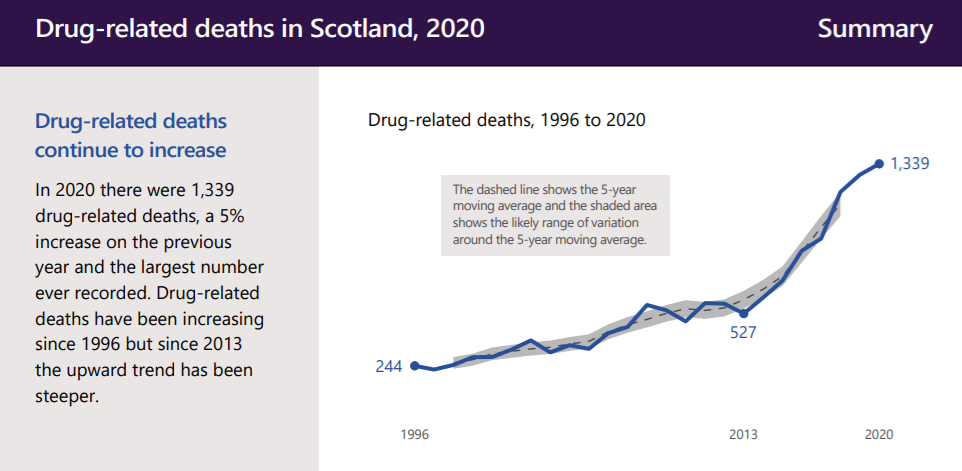Drug-deaths rose to 1,339 in 2020
The number of drug-related deaths in Scotland has risen by another five per cent, taking the total to 1,339 deaths in 2020.
This is the largest number of drug-related deaths since records began in 1996.
The National Records of Scotland figures also show deaths have increased by 4.5 times in the last 20 years.
People from deprived communities were 18 times more likely to die from a drug-related death than those from the least deprived areas.
Almost two thirds of deaths were people aged between 35 and 54, and more men than women died.
The Greater Glasgow and Clyde health board area recorded the highest drug-related death rate in 2020, following by Ayrshire and Arran and then Tayside.
But Dundee City remains the drug-death capital, having the highest drug-related death rate of any local authority area.
Scotland’s drug-death rate is 3.5 times higher than the UK as a whole and remains the highest of any European country.
Tweeting immediately after the statistics were published, First Minister Nicola Sturgeon said the government would not “shirk the responsibility” for the deaths.
She also said action was underway to provide more support for those battling with addiction.
She said: “The number of lives lost to drugs is unacceptable, each one a human tragedy. Scottish Government does not shirk the responsibility & we are determined to make changes that will save lives. These 2020 figures (though no less shameful because of it) predate actions set out at start of year.
“We now have a dedicated drugs minister in Angela Constance, a substantial funding commitment and action underway to eg ensure faster access to community support, treatment and rehab. We will also continue to argue for reform of drugs law, which is not currently within our power.
“Today, my thoughts are with every family who has lost a loved one - I am sorry for the loss you have suffered. However, I know that from Scottish Government what is required isn’t words, but action to prevent people dying, and that is what we are determined to deliver.”

Graphic: National Records of Scotland
Drugs Minister Angela Constance, who came into post at the end of last year after the publication of the 2019 statistics, described today's figures as "heartbreaking".
She said: "We are working hard to get more people into the treatment that works for them as quickly as possible. Without treatment, there is little hope of recovery so we are funding as many community and third sector initiatives as we can so that individuals have the widest possible choice and can opt for the support which suits them and their family.
“Of the £250m announced over the next five years, £100m will go on improving the provision of residential rehabilitation and I will update Parliament on progress in this area after the summer recess."
Scottish Conservative leader Douglas Ross called for a "united national effort" to respond to the problem.
His party has also proposed a Right to Recovery Bill, which will guarantee access to treatment for anyone struggling with drug addiction, including residential rehab.
Ross said: "The drugs crisis is our national shame. It is a stain on Scotland that so many of our most vulnerable people have been left without hope, crushed by a system that is thoroughly broken.
“This is not a day for political posturing but it is a simple fact that the government’s small steps are not cutting it. The crisis is getting worse and spiralling out of control.
"The Scottish Parliament passed COVID laws in three days. We can introduce a right to recovery law swiftly if we adopt a similar sense of urgency."
Labour's Anas Sarwar called for investment in "person-centred treatment and recovery".
He said: "Today’s statistics shouldn’t be the wake-up call. Almost daily deaths should be. These are the tragic consequences of years of failure to get to grips with this growing crisis in Scotland and to address the threat posed by drugs.
"We need to look at every option to address this travesty - but we cannot afford to kick this into the long grass when lives are at stake. We can and must act now, by investing in a range of services and delivering truly person-centred treatment and recovery.”
The Scottish Greens called for a change in approach from both of Scotland's governments.
Gillian Mackay MSP said: "The approach to drugs, pursued by both the UK and Scottish governments, must change.
"The war on drugs has demonstrably failed, it’s long past time we treated this crisis as the public health emergency that it is.
"It is time for an approach which focuses on restoring people’s dignity and treating their addiction, rather than criminalising them."
And the Lib Dems have criticised the Scottish Government for cutting budgets for alcohol and drug partnerships.
Alex-Cole Hamilton MSP said: "Help and expertise that people relied upon was needlessly surrendered when it should have been expanded.
"It was Nicola Sturgeon's choice to ignore this unfolding epidemic. Issuing apologies now is too late for thousands of people. The victims of drugs and their families were failed. It is a scar on the conscience of this Scottish Government."
Holyrood Newsletters
Holyrood provides comprehensive coverage of Scottish politics, offering award-winning reporting and analysis: Subscribe